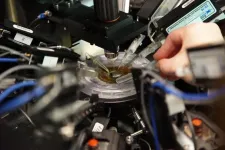(Press-News.org) UC San Diego Health is the first hospital system in the region to offer a new immunotherapy treatment for metastatic melanoma. The personalized cellular therapy derived from tumor infiltrating lymphocytes (TIL), is the first solid tumor therapy on the market approved by the U.S. Food and Drug Administration (FDA).
“This one-time cellular immunotherapy is a powerful and robust tool to treat patients with advanced melanoma resistant to other approved therapies and who have limited treatment options,” said Gregory Daniels, MD, PhD, professor of medicine in the Department of Medicine at University of California San Diego School of Medicine and medical oncologist at UC San Diego Health.
“Our ability to provide novel therapies, like TIL, reflects our distinction as a National Cancer Institute (NCI)-designated Comprehensive Cancer Center," said Diane Simeone, MD, director of Moores Cancer Center at UC San Diego Health. "None of this would be possible without the extraordinary team who led the clinical trials and brought this new, advanced treatment option for melanoma.”
The process of TIL therapy using lifileucel (AMTAGVI), begins by collecting and isolating a patient’s unique cancer-fighting white blood cells, called lymphocytes, or T-cells, from the surgically removed tumor. The T-cells are isolated, expanded and stimulated to enhance their ability to recognize, infiltrate and attack cancer cells. This army of TIL cells is then infused back into the patient.
“The TIL clinical trials showed favorable treatment results and improved outcomes compared to other options available following the progression of melanoma on standard frontline therapy,” said Daniels, principal investigator of the clinical trials conducted at UC San Diego Health.
Skin cancer is the most common form of cancer in the United States, with melanoma accounting for nearly 1% of skin cancers but causing the most skin cancer deaths, according to the American Cancer Society. Melanoma deaths have fallen by 5% per year largely because of supported research and clinical advancements in treatment.
“The ability to provide cellular therapy holds the potential for remission for some patients with melanoma and provides a new tool to the growing number of options for patients whose cancer cells have spread from where they started to other parts of the body,” said Daniels.
UC San Diego Health currently offers CAR T-cell therapy, another promising type of immunotherapy, to treat certain types of blood cancer, such as non-Hodgkin lymphomas and multiple myeloma.
“This emerging treatment is a driving force to many other cellular and gene therapies being pioneered at UC San Diego Health,” said Ayad Hamdan, MD, physician-in-chief at Moores Cancer Center. “This transformational approach to treating skin cancer and solid tumors directly aligns with our health system’s commitment and investment in the future of cancer immunotherapy. It’s a tremendous opportunity to expand our reach and deliver leading-edge treatment to patients with advanced cancers that are underserved by current treatment modalities.”
As an NCI-designated Comprehensive Cancer Center, Moores Cancer Center at UC San Diego Health is among the top 4% of approximately 1,500 cancer centers in the United States, and one of only 56 Comprehensive Cancer Centers in the nation. Patients have access to personalized care by physicians setting treatment standards nationwide and access to clinical trials that are identifying promising, new therapy options. According to the 2023-2024 U.S. News & World Report "Best Hospitals" survey, cancer services at UC San Diego Health ranked 20th in the nation.
# # #
END
UC San Diego Health first in region to provide novel therapy for melanoma
New FDA approved treatment increases a patient’s own army of cancer-fighting cells aimed to combat the most serious type of skin cancer
2024-06-04
ELSE PRESS RELEASES FROM THIS DATE:
Zapping the right brain cells: The path to improved stimulation
2024-06-04
By Jake Siegel
SEATTLE, WASH.—June 4, 2024—New research by scientists at the Allen Institute’s Brain and Consciousness group and Cedars-Sinai offers an unprecedented look at how neurons respond to ES. Far from being uniform, different types of neurons showed distinct patterns of ‘syncing up’ with electrical fields. These patterns varied depending on the rate at which the ES was delivered.
The findings, published today in Neuron, could help doctors fine tune where, when, and how ...
How an Indian government policy backfired: the unintended consequences of price regulation of prescription drugs
2024-06-04
Researchers from Indian Institute of Management Calcutta, University of Chicago, and Management Development Institute, Gurgaon published a new Journal of Marketing study that examines the unintended consequences of an Indian government healthcare policy.
The study, forthcoming in the Journal of Marketing, is titled “Do No Harm? Unintended Consequences of Pharmaceutical Price Regulation in India” and is authored by Saravana Jaikumar, Pradeep K. Chintagunta, and Arvind Sahay.
In countries without universal health insurance or developed health care systems, governments try to make drugs affordable and accessible. For instance, ...
Exercising during pregnancy normalizes eating behaviors in offspring from obese mice
2024-06-04
Maternal obesity impacts the eating behaviors of offspring via long-term overexpression of the microRNA miR-505-5p, according to a study publishing June 4th in the open-access journal PLOS Biology by Laura Dearden and Susan Ozanne from the MRC Metabolic Diseases Unit, Institute of Metabolic Science, University of Cambridge, UK, and colleagues.
Previous studies in both humans and animal models have shown that the offspring of obese mothers have a higher risk of obesity and type 2 diabetes. While this relationship is likely the result of a complex relationship between genetics and environment, emerging ...
Managing mental health should be about more than mind
2024-06-04
Clinicians often default to treating mental health conditions with a variety of medication. This approach, however, largely ignores the role of environment, lifestyle, and social factors. Mental Health professionals must work toward a more holistic management picture, Sidarta Ribeiro, Ana Paula Pimentel, Paulo Amarante and colleagues at the Federal University of Rio Grande do Norte, Federal University of Rio de Janeiro and FIOCRUZ in Brazil argue in the new open-access journal PLOS Mental Health on June 4.
More people than ever are being diagnosed with mental health conditions—particularly children and young adults. The World Health Organization estimates that mental health ...
Signaling between brain regions altered in teenage internet addiction
2024-06-04
Max Chang and Irene Lee of University College London review neuroimaging studies of the effects of internet addiction on adolescent brains. Published June 4 in PLOS Mental Health, the study indicates that internet addiction is associated with disrupted signaling in the regions of the brain that are involved in multiple neural networks. These networks play an important role in controlling our attention, in association with intellectual ability, working memory, physical coordination, and emotional processing—all of which ...
In “mental illness” and “mental health”: how language around psychiatric conditions shifts
2024-06-04
A new survey of nearly 340,000 texts spanning 79 years shows that generic terms in mental health have shifted away from words like “disease” and “disturbance” and toward “psychiatric” and “mental health,” with “mental illness” becoming the most-used term. Nick Haslam and Naomi Baes at the University of Melbourne in Australia present these findings in the new open-access journal PLOS Mental Health on June 4.
The authors state that while words such as “crazy” and “lunatic” ...
Methods to quit smoking effective regardless of mental health history
2024-06-04
Sarah Jackson and colleagues from University College London and King’s College London branches of the SPECTRUM Consortium conducted a survey to study how mental health relates to methods people use to quit smoking, also known as smoking cessation aids. While the number of adults who smoke cigarettes has declined globally, people with mental health conditions are more likely to smoke and to do so more heavily. Because of these differences in tobacco use, the researchers theorized that the effectiveness of smoking cessation aids may be altered in individuals with a mental health condition. However, in their ...
Lived experience should be centered in future mental health research, say people with mental health conditions and their families and carers in nationwide Australian survey
2024-06-04
Lived experience should be centered in future mental health research, say people with mental health conditions and their families and carers in nationwide Australian survey.
####
Article URL: https://journals.plos.org/mentalhealth/article?id=10.1371/journal.pmen.0000010
Article Title: Experience is central and connections matter: A Leximancer analysis of the research priorities of people with lived experience of mental health issues in Australia
Author Countries: Australia
Funding: The ALIVE National Centre for Mental Health Research Translation is supported by a grant from the National Health and Medical Research Council (GNT2002047) ...
Internet addiction affects the behavior and development of adolescents
2024-06-04
Adolescents with an internet addiction undergo changes in the brain that could lead to additional addictive behaviour and tendencies, finds a new study by UCL researchers.
The findings, published in PLOS Mental Health, reviewed 12 articles involving 237 young people aged 10-19 with a formal diagnosis of internet addiction between 2013 and 2023.
Internet addiction has been defined as a person’s inability to resist the urge to use the internet, negatively impacting their psychological wellbeing, as well as their social, academic and professional lives.
The studies used functional magnetic resonance imaging (fMRI) to inspect the functional connectivity (how regions of ...
Giant viruses found on Greenland ice sheet
2024-06-04
Every spring when the sun rises in the Arctic after months of darkness, life returns. The polar bears pop up from their winter lairs, the arctic tern soar back from their long journey south and the musk oxen wade north.
But the animals are not the only life being reawakened by the spring sun. Algae lying dormant on the ice starts blooming in spring blackening large areas of the ice.
When the ice blackens it’s ability to reflect the sun diminishes and this accelerates the melting of the ice. Increased melting exacerbates global ...
LAST 30 PRESS RELEASES:
Natural compound from pomegranate leaves disrupts disease-causing amyloid
A depression treatment that once took eight weeks may work just as well in one
New study calls for personalized, tiered approach to postpartum care
The hidden breath of cities: Why we need to look closer at public fountains
Rewetting peatlands could unlock more effective carbon removal using biochar
Microplastics discovered in prostate tumors
ACES marks 150 years of the Morrow Plots, our nation's oldest research field
Physicists open door to future, hyper-efficient ‘orbitronic’ devices
$80 million supports research into exceptional longevity
Why the planet doesn’t dry out together: scientists solve a global climate puzzle
Global greening: The Earth’s green wave is shifting
You don't need to be very altruistic to stop an epidemic
Signs on Stone Age objects: Precursor to written language dates back 40,000 years
MIT study reveals climatic fingerprints of wildfires and volcanic eruptions
A shift from the sandlot to the travel team for youth sports
Hair-width LEDs could replace lasers
The hidden infections that refuse to go away: how household practices can stop deadly diseases
Ochsner MD Anderson uses groundbreaking TIL therapy to treat advanced melanoma in adults
A heatshield for ‘never-wet’ surfaces: Rice engineering team repels even near-boiling water with low-cost, scalable coating
Skills from being a birder may change—and benefit—your brain
Waterloo researchers turning plastic waste into vinegar
Measuring the expansion of the universe with cosmic fireworks
How horses whinny: Whistling while singing
US newborn hepatitis B virus vaccination rates
When influencers raise a glass, young viewers want to join them
Exposure to alcohol-related social media content and desire to drink among young adults
Access to dialysis facilities in socioeconomically advantaged and disadvantaged communities
Dietary patterns and indicators of cognitive function
New study shows dry powder inhalers can improve patient outcomes and lower environmental impact
Plant hormone therapy could improve global food security
[Press-News.org] UC San Diego Health first in region to provide novel therapy for melanomaNew FDA approved treatment increases a patient’s own army of cancer-fighting cells aimed to combat the most serious type of skin cancer






